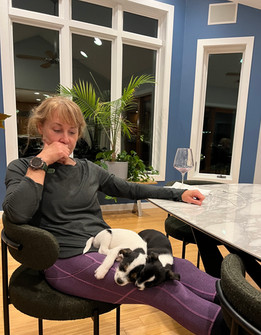Opening Hearts and Homes to Foster Animals
- Shari Berg
- Oct 31, 2025
- 4 min read
Kristin Wilson still remembers the first time she had to say goodbye to a foster pet. She cried so hard after the adoption that she couldn’t drive and had to pull over. Now, Wilson has learned to see the goodbyes differently. She’s just dog-sitting until the animals find their forever families.
“That dog has people somewhere,” said Wilson, who fosters for Cross Your Paws Dog Rescue. “If you go into it with that mentality, it helps a lot.”
Wilson is one of hundreds of volunteers across the Pittsburgh region who open their homes to animals in need. These foster parents provide temporary care for cats and dogs until they can be adopted. Without them, local rescue organizations couldn’t function.
Kelly Kraus, founder of Conquer the Colony, currently has about 120 cats waiting for homes. Her organization relies on just 15 foster families and a partnership with Cats ’n At in Wexford to house all those animals.
“There are too many cats and not enough adopters,” Kraus said. “Cats are being born outside, and they’re literally being born to die.”
Kraus started Conquer the Colony in 2019 after discovering a feral cat problem at a business where her stepfather worked. She posted on Facebook asking for help and was told if she wanted anything done, she had to do it herself. Someone taught her how to trap feral and stray cats, and the organization grew from there.
Tracking the full scope of the problem proves difficult because all programs rely on volunteers who lack time to document everything accurately. Kraus points to funding as a major barrier. A free spay and neuter program in Pittsburgh ended after city officials decided people were abusing the system.
“It literally comes down to time and money — the trapping, the spaying, and the neutering,” she said.

The work extends beyond providing food and shelter. Amy Nelson discovered this when she started fostering baby bottle kittens with Animal Friends — orphans without mothers who need feeding every three hours. A pet foster since 2008, Nelson has logged 12,093 service hours and received a Lifetime Achievement Award in 2017 for her service with the organization.
“I found that really gratifying because it was life or death in a lot of cases,” Nelson said. “You have to get used to the fact that you can do everything right and still lose a kitten.”
She later switched to caring for puppies and dogs. Through Humane Animal Rescue, she fostered bottle-baby puppies for the first time after 20 years of volunteering. “It’s so rewarding to see them go from a helpless state to watch them wag their tails for the first time,” she said.
Kraus learned similar lessons during her first fostering experience. She took in two sickly barn cats who needed emergency care on Thanksgiving. Both kittens fell over after eating. They had panleukopenia, an almost always deadly disease. The kittens died.
“You end up doing more than you ever think you’re going to be doing,” Kraus said. “I always think to myself what made me want to keep doing fostering because that experience was so traumatic.” She’s never really answered that question. However, she hasn’t let the experience stop her from continuing her work.
How long a foster parent keeps an animal varies. Wilson has had dogs for as little as one day and as long as a year.
Wilson started fostering in 2019 with Butler County Humane Society after her 11-year-old daughter, who struggled with anxiety, begged for the opportunity. She worried about giving her daughter a pet that would be taken away, but the child’s therapist recommended it. They’ve been fostering ever since.
Wilson has fostered 74 dogs since 2019. She now works with Cross Your Paws, a foster-based rescue that partners with overwhelmed shelters in Kentucky and West Virginia. Dogs coming from out of state can be adopted quickly because families are permitted to take them home before they’re spayed or neutered. However, as part of the adoption agreement, families must return the animal to the rescue for spaying or neutering when they reach the appropriate age. The American Kennel Club recommends spaying or neutering dogs between the ages of six and nine months.
Legal cases create the longest waits. When humane officers seize dogs but owners refuse to surrender them, the animals become evidence in court cases. Wilson kept one dog for a year under these circumstances. “Unfortunately, in a lot of these cases, a dog can be in a shelter for a year or more since they can’t be adopted,” she said.
Nelson has dealt with similar situations. Recently, she fostered two 4-month-old puppies for two weeks before they were adopted. But medical issues or legal holds can extend the timeline significantly.
The barrier to entry is lower than most people think. Rescue organizations provide training, though requirements vary. Humane Animal Rescue requires volunteers to watch training videos and pass quizzes. Other shelters have simpler processes.
“You don’t need a lot of space to be a foster parent,” Kraus said. “Anything is better than a cat living outside in bad conditions where they can end up hurt or dead.”

Organizations check that existing pets are spayed or neutered and current on vaccines. Renters need landlord approval. Beyond that, shelters match volunteers with appropriate animals. If fostering doesn’t work out after a few days, volunteers can return the animal without pressure.
“The shelters are all very gracious,” Nelson said.
People without time to foster full-time can still help. Kraus suggested picking up cats from veterinarians for organizations. Wilson’s rescue needs dog walkers, sitters for when fosters travel, vaccination team members, and transport volunteers.
For those considering adoption, Nelson suggests checking local shelters before going to breeders. “Anyone who’s thinking of getting a dog, and they want a Labradoodle or some tiny boutique dog, check the shelters,” she said. “You’d be surprised what you’ll find.”
Wilson encourages anyone interested in fostering to give it a try. Organizations cover all costs, and reputable rescues should be financially secure, so volunteers don’t bear expenses. Her organization conducts background checks and helps quickly if a dog isn’t compatible with a foster home.
“The goodbye is hard,” Wilson said. “I won’t ever tell anyone otherwise. But when you see how happy the dog is in their new home and how much you’ve touched the lives of their family, the reward is beyond worth it.”
To learn more about these organizations:
Conquer the Colony – conquerthecolony.com
Animal Friends – thinkoutsidethecage.org
Cross Your Paws – crossyourpaws.com
Butler County Humane Society – butlercountyhs.org




























Comments